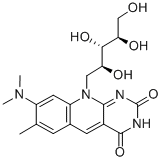Chemical Properties
Dark Reddish/Brown Crystalline Solid
Uses
An analog known to compete with Riboflavin in Lactobacillus casei. Riboflavin kinase substrate and inhibitor
Uses
Has weak antibacterial activity against some gram-positive bacteria, especially Staphylococcus aureus, Sarcina latea, Bacillus cereus, and Bacillus subtilis. Also exhibits antiriboflavin activity and inhibits the biosynthesis of riboflavin by a r
Uses
Roseoflavin is an antibacterial pigment isolated from Streptomyces davawensis as an anti-metabolite of riboflavin. Roseoflavin is used as a substrate to mimic riboflavin in flavin biosynthesis, but leading to the formation of inactive flavin co-factors. More recently, roseoflavin has been shown to be an important regulator of bacterial gene expression by binding to untranslated regions of RNA, so-called ribo-switching sites.
Definition
ChEBI: A benzopteridine that is riboflavin in which the methyl group at position 8 is substituted by a dimethylamino group.
Biochem/physiol Actions
Roseoflavin is an analog of flavin mononucleotide (FMN) and riboflavin with antimicrobial activity. Roseoflavin is converted to the flavin mononucleotide (FMN) analog roseoflavin mononucleotide (RoFMN) by flavokinase and to the flavin adenine dinucleotide (FAD) analog roseoflavin adenine dinucleotide (RoFAD) by FAD synthetase, and acts as a riboflavin antagonist. Roseoflavin is an inhibitor of bacterial riboflavin riboswitches, cis regulatory elements present in non-coding RNA that specifically bind to natural ligands to regulate gene expression. Roseoflavin, converted to RoFMN, blocks the flavin mononucleotide riboswitch-mediated expression of the ribB gene, which is required for riboflavin biosynthesis.

